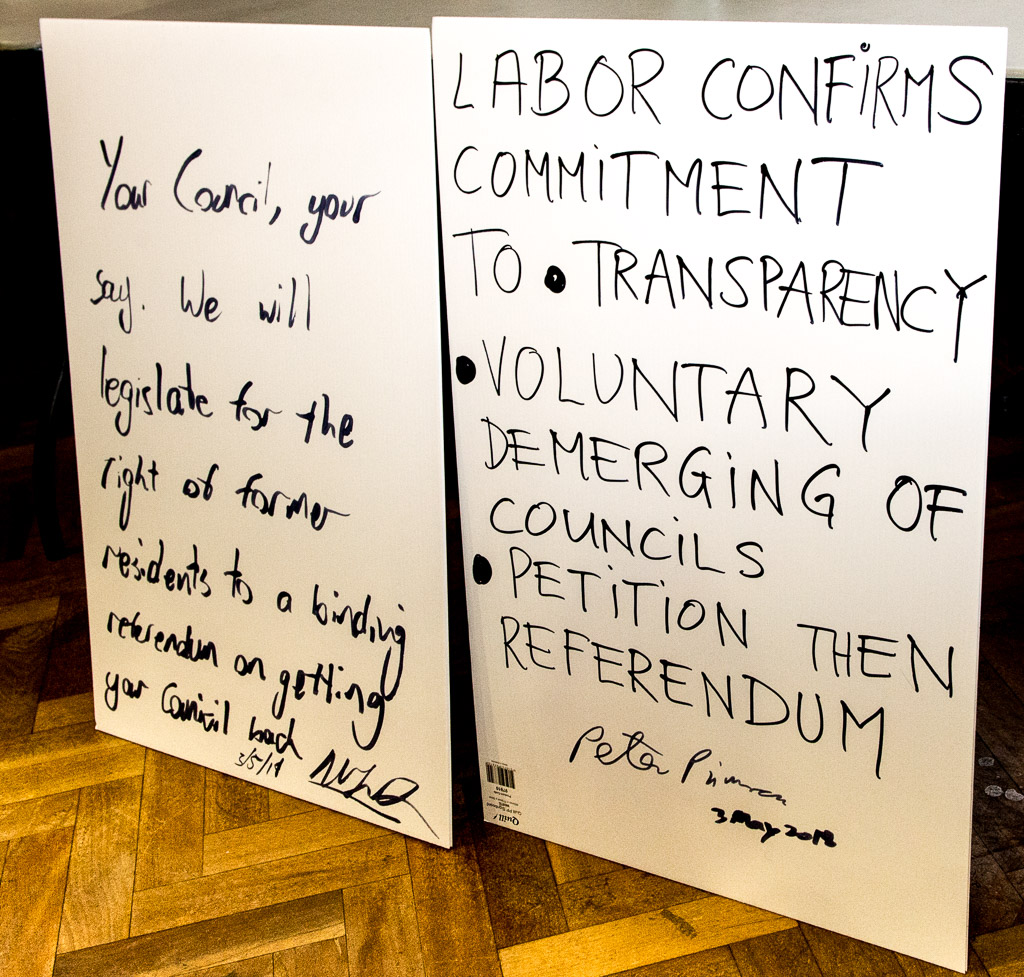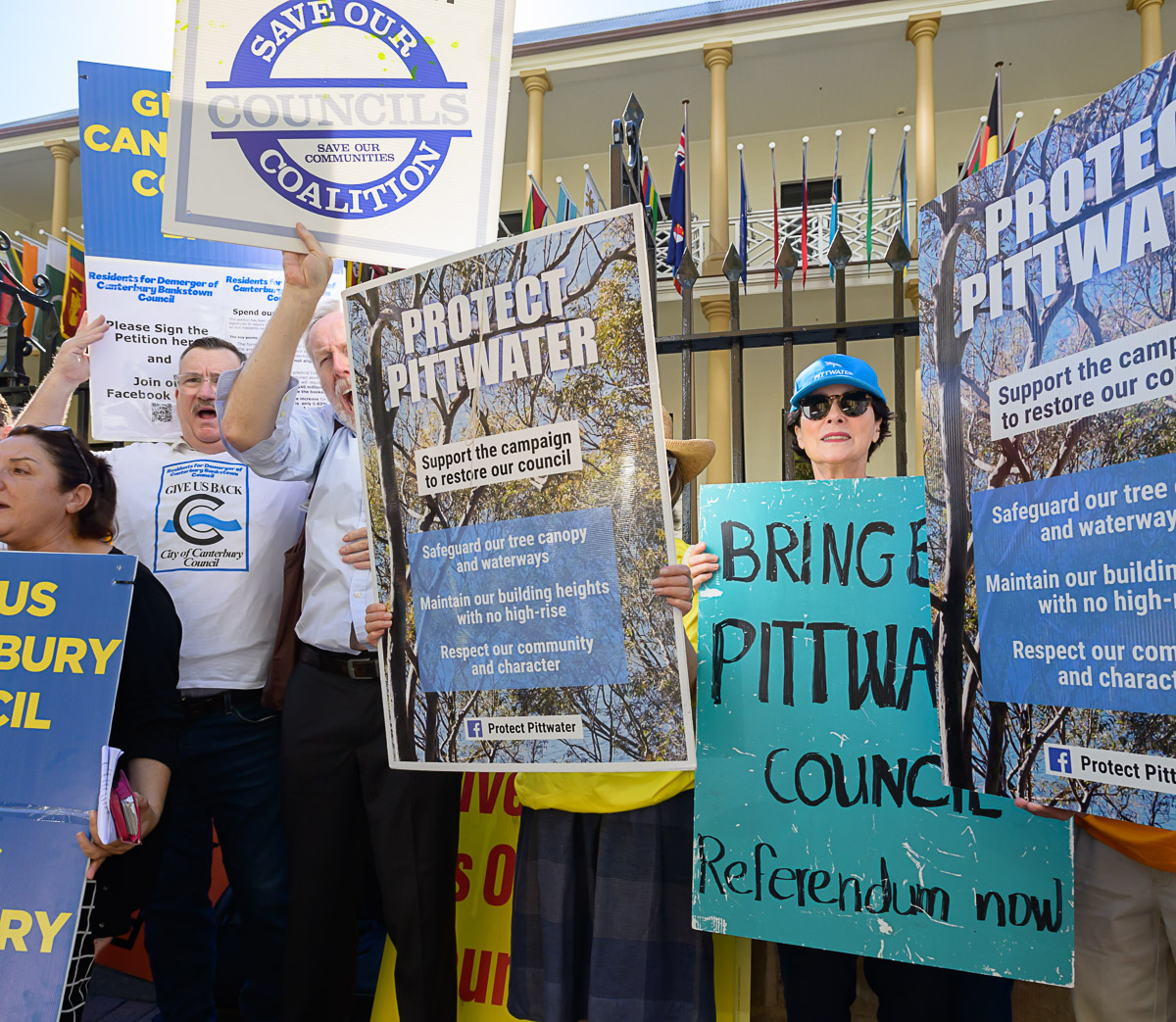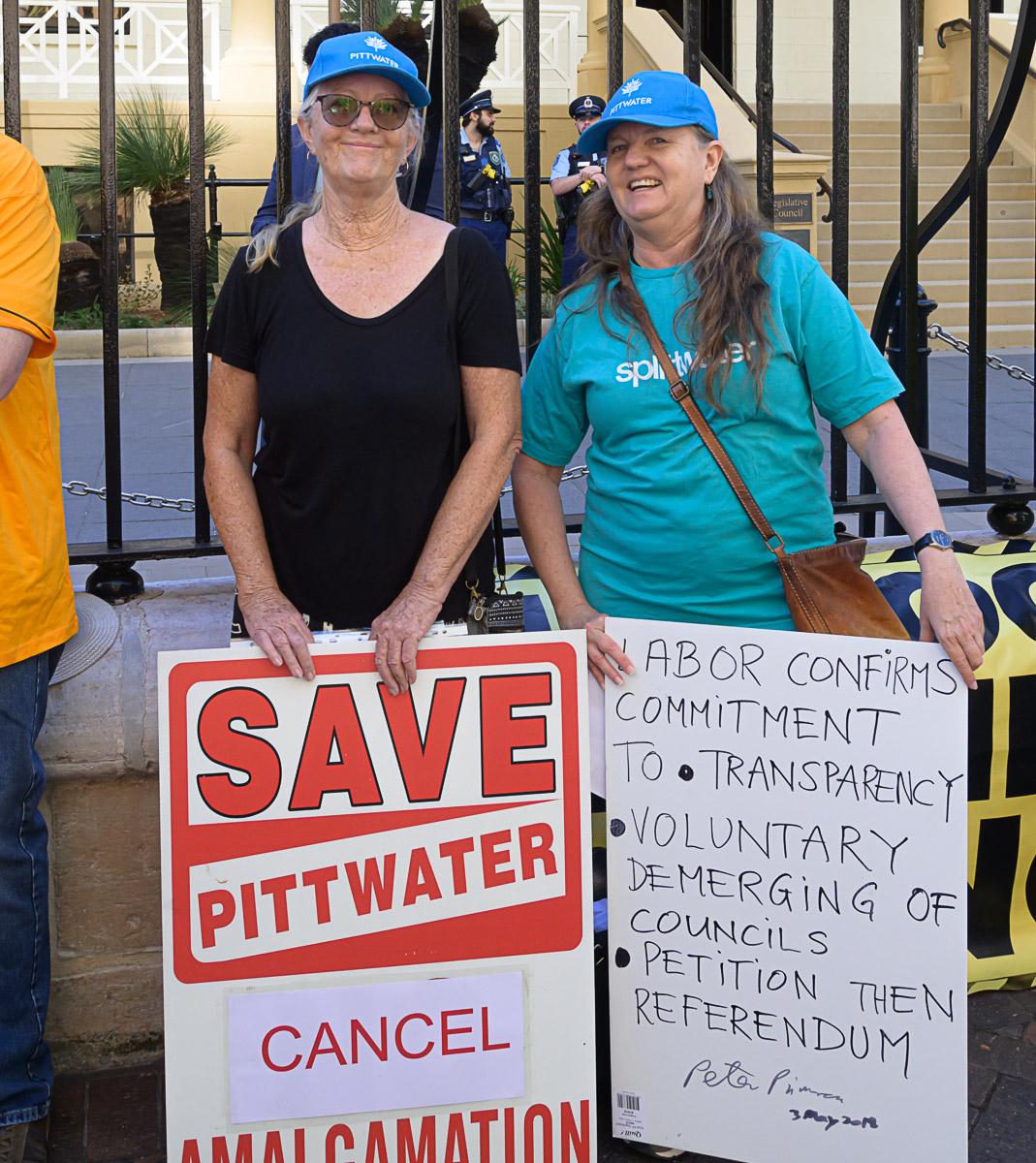De-merge of Councils Delay/Obfuscate Shenanigans Continued under new Labor government: Communities have run out of patience
This week groups from across New South Wales gathered on Macquarie street on Tuesday March 12, the same day the House had listed in the Business Papers the debate for NSW Labor's bill on de-amalgamation, the Local Government Amendment (De-amalgamations) Bill 2024. The Bill, introduced by The Hon. Ron Hoenig, Minister for Local Government, to the NSW Parliament on Tuesday February 6, removes changes inserted by previous Minister for Local Government Steph Cooke.
However, that debate did not take place.
Among those at the Demerge Alliance rally was Cr. Miranda Korzy who held up a signed corflute from a 2017 community forum:

Politicians at the meeting, NSW Labor’s Local Government spokesman Peter Primrose and his Greens’ counterpart David Shoebridge shook hands and signed statements at the forum agreeing to support a plebiscite within the former Pittwater council area for a demerger.
''Before the mergers, Pittwater Council carried out a survey which showed 89 per cent of residents wanted to retain our standalone council. Yet we were never given a vote on the issue.Pittwater was a financially sound council, having won the Bluett Award the year before the merger. A council where local representatives made decisions on behalf of local residents.Nearly eight years on, we can see the outcome of the amalgamation.We now have a situation where the six councillors from the two wards representing the former Pittwater LGA, can be outvoted on any decision by the other nine Northern Beaches Councillors.We have a situation where staff are short on the ground. Residents are frustrated by a lack of compliance officers and where local Dad’s, worried about snakes in knee high grass, are out mowing local parks and pathways over summer.And we have a situation where the council is having to borrow money from our local Mona Vale Cemetery fund to pay for a new software system.The amalgamation has not solved the council’s budgetary problems and we are now faced with either having to cut services or raise rates in the next financial year.Pittwater residents have campaigned for nearly eight years for the return of our council and Labor promised us a demerger referendum.It’s time Labor honours that promise and ensures its current bill, before the NSW Parliament, gives communities the vote we’ve been denied until now.It must remove the requirement for merged councils to approve deamalgamations - because on councils like mine, that’s never likely to happen.And we need the new amendment to ensure state funding is available to cover initial demerger costs. Otherwise, it’s likely that persisting with these mega councils - which require an extra layer of middle management - will end up costing not only local communities but also the state government more to run in the long term.And finally, Parliament must ensure those plebiscites are binding and not reliant on Boundaries Commission investigations or even the minister's approval. Democracy is not a commodity and the will of the people must be respected.''
On May 13th, 2021 the then coalition NSW government wrote a new opportunity for fully funded council demergers, updating local government laws to allow for council-initiated proposals within a fixed time frame.
Save Our Councils Coalition vice president Sue Young said then that under changes passed by both Houses of the NSW Parliament in the Local Government Amendment Bill 2021, councils amalgamated in 2016 would be able to launch demerger bids within 10 years of their establishment.
The cost of any de-amalgamation of the new area resulting from a business case submitted under the new provision would be fully funded by the state government, Ms Young said.
However, she questioned the usefulness of the amendment unless a majority of councillors supported a demerger.
“The amendment may not be a viable pathway for Pittwater residents wanting to de-amalgamate from the Northern Beaches Council,” Ms Young said.
“I consider the benefit for Pittwater is that the community proposal should be treated in the same manner as a proposal from an amalgamated council and fully funded by the government, with limits on response and processing times.”
Chapter 9 How are councils established? of the Local Government Act states:
Part 1 Areas
Division 2 What must be done before areas can be constituted?
215 Who may initiate a proposal?
(1) A proposal may be made by the Minister or it may be made to the Minister by a council affected by the proposal or by an appropriate minimum number of electors.
(2) An appropriate minimum number of electors is—
(a) if a proposal applies to the whole of an area or the proposal is that part of an area be constituted as a new area—250 of the enrolled electors for the existing area or 10 per cent of them, whichever is the greater, or
(b) if a proposal applies only to part of an area—250 of the enrolled electors for that part or 10 per cent of them, whichever is the lesser.
However, when Protect Pittwater, the residents formed group working to get Pittwater Council back, presented a petition of thousands of signatures calling for the same in May 2018, not just the 250, and well over any 10% of enrolled electors within the original Pittwater Council boundaries, this was rejected by then Liberal Minister for Local Government Gabrielle Upton who stated they now had to get 10% across the whole of the newly formed council.
This movable interpretation of the Act, which was not received by PP until February 20, 2020, was viewed as a stymie measure, more so when Pittwater residents recalled Warringah had campaigned in Macquarie street, and across the peninsula to have the only escaped from that former council for 21 years Pittwater LGA remerged so, as one Warringah resident stated during the hearings for the same prior to May 12 2016, 'Pittwater could foot the bill for Warringah's sports again' - which apparently had been lacking, and whose rates had been increasing to an alarming grade, without those extra annual millions.
This had been one of the primary reasons for the decades long campaign to establish Pittwater Council in the first place - a draining of money from Pittwater residents to spend in places other than Pittwater. Lawns did not get mowed in parks and reserves, footpaths did not get fixed, maintenance of community assets or the building of new ones for the Pittwater community did not occur. This, along with the approval of developer benefit only monstrosities, emphasised the stark cultural differences between the two areas, although all three merged councils, Manly, Warringah and Pittwater worked well together on communal interest established through SHORAC.
The Hon. Ron Hoenig modifications not only remove Ms Cooke's clause, it also makes any proposal by councils merged with those others the provenance of those Councils, thereby still maintaining authority over the former council residents through quashing any process called for by those residents by block voting by aligned councillors.
This was writ large on Friday March 15 when The Hon. Hoenig announced he had received the NSW Local Government Boundaries Commission’s report on Inner West Council’s business case for de-amalgamation.
''The report recommends the proposed demerger of Inner West Council should not proceed, stating this would be the best outcome for residents and ratepayers of the current local government area.'' the Minister said in a statement
''I have considered the findings and accept the Boundaries Commission’s recommendation.
Today, I have exercised my decision making powers under 218CC(5) of the Local Government Act to not support the proposal put forward by Inner West Council for demerger.''
The business case was written, according to one IWC Councillor, to ensure this result.
The Inner West Council was one of those formed by the NSW Government in May 2016 by forcibly amalgamating Ashfield, Leichhardt and Marrickville councils.
In December 2021, a non-binding poll was conducted, which saw the Inner West community vote to de-amalgamate the current council and revert back to three separate ones. A year later, on December 12, 2022, Mayor Darcy Byrne wrote a letter to then Minister for Local Government, Wendy Tuckerman, after resolving at a council meeting to respect the community’s wishes and submit the Inner West Council de-amalgamation Business Case.
The letter said that the full cost of de-amalgamating the Inner West Council would be between $178 million to $190 million, which the NSW Government would have to pay.
These figures have since been widely disputed ever since, including at the IWC Meeting that bloc-voted to submit the same with a Labor Cr. casting the extra one vote.
Independent Councillor John Stamolis, who was a statistician and data analyst at the Australian Bureau of Statistics (ABS) for over forty years, said, “The report shows that Inner West Council says they will need 163 staff for 4 years at $26.5 million per year. That’s an average of $163,000 per staff member each year. They are certainly not back office and service staff at that price!”
“Over 4 years, this adds $106 million to the cost for demerger. It is the biggest of the demerger costs by far. Yet again, Council are grossly inflating the cost of demerger in the hope that no one notices and that they won’t be questioned about this.”
The NSW Labor government’s decision to reject the Inner West Council’s inadequate business case is not a surprise because the Labor-run Council’s case was deliberately inadequate, said Residents for Deamalgamation.
“Residents are furious. They voted 65.2 % for de-amalgamation and once again their voice has been ignored,” said Rochelle Porteous from Residents for Deamalgamation.
“This was a political stitch-up that has been a long time in the making.”
Residents voted 62.5% to demerge the giant IWC in a 2021 poll conducted by the NSW Electoral Commission.
“The Labor-run IWC claims it has done what it had to do to respect the resident’s vote to demerge, but it hasn’t,” said Pip Hinman from Residents for Deamalgamation.
The Labor dominated council was asked by residents and other councillors to have input into the business case and were refused. The result was a business case that did not sketch out how a demerged council could work — including which services could be shared.
It did not advance a plan to mitigate risks, including council jobs. It was essentially a business case against demerger.
The Greens and independent councillors voted against sending it to the then Coalition government, but Labor has the majority by one vote on council.
When these councillors pointed out that the business case was inadequate Labor Mayor, Darcy Byrne, told them that “they could do their own”. RFD states
“Labor has cynically ignored the wishes of a majority of the community across the inner west, who voted two to three to demerge in 2021, while pretending it was respecting the democratic will”, said Ms Porteous.
The case sent by Council to the Boundaries Commission was a political case, written for Labor councillors who did not want council to demerge.
“The IWC was the first — and looks likely to be the only — council to give its residents a poll on the 2016 forced mergers, said Ms Hinman.
“This is because NSW Labor is moving to ensure that no other council will be able to do the same: its new ‘deamalgamation’ bill, due to be debated shortly in the lower house, expressly removes this clause.”
“The NSW Labor minster’s move to accept a faulty NSW Boundaries Commission verdict on a faulty IWC deamalgamation case is a kick in the teeth for the inner west, where rates have increased and services have declined,” said Ms Hinman.
“It is also a kick in the teeth for the residents suffering the same in other forcibly merged councils,” Ms Hinman added.
“As councils are forced to implement NSW Labor’s controversial rezoning dictates using the same one-size-fits-all approach, Labor councillors are doing the same thing as they did on the demerge issue: pretend to listen while agreeing to the developer-led changes which ride rough-shod over communities,” said Ms Porteous.

March 12 2024 at Macquarie Street - Protect Pittwater Members and Pittwater Residents speaking up. Photo: Michael Mannington OAM
Despite the mood of rising anger, residents and Protect Pittwater members, continue to gather signatures to reinstate their Pittwater Council and are still calling on the Government to stop being the next obstruction and epitomical flipside of the political coin.
Last month Protect Pittwater Association president Simon Dunn said amendments to the Local Government Act proposed by the NSW government will do nothing to restore democracy for minority councils such as Pittwater, amalgamated into the Northern Beaches Council in 2016.
Mr Dunn said Protect Pittwater wrote to Local Government Minister Ron Hoenig in September 2023 pointing out that the act was missing:
(a) A mechanism for a former area to be reinstated without a resolution of the new amalgamated Council of which the former area has a minority of Councillors to support such a resolution;
(b) an orderly procedure for assets and staff to be allocated when a former Council area was reinstated.
"The legislation introduced to Parliament by Minister Hoenig does nothing to address these two shortcomings and breaks the policy promise Labor took to the last two elections," Mr Dunn said.
"Instead, it perpetuates the endless deferring of decisions between the boundary commission and the minister, with neither being compelled to respect the strong desire of the former council residents to see their beloved Pittwater Council reinstated.
"Protect Pittwater instead urges NSW Labor to amend their proposed legislation to provide for a plebiscite of residents of a former council area - which was already found to be financially viable - to be the only mechanism required to reinstate that former Council.
"The desire for a demerger remains strong in Pittwater, where a statistically reliable survey conducted by the former council before the mergers showed 89 per cent of residents had wanted to remain in our standalone council.
In 'Pittwater Uprising! a secessionist’s view' by Robert Dunn, Pittwater’s first elected Mayor explained:
''The movement for secession, led by Des Creagh of North Avalon, began in 1966. It gathered momentum through the 1980s and 90s, reflecting the growing concerns of residents about the quality of their built and natural environments. Not only was the malapportionment of rate income seen as intrinsically unfair, planning and development decisions which excluded or frustrated the community engendered much passion and activism, leading to the view that secession could be the only remedy.
From this period of agitation and sedition there emerged two committed and tenacious leaders in the persons of Eric Green and Robert Dunn. First elected to Warringah Council, they contended against sustained opposition to represent community aspirations and achieve equity for the residents of A Riding.''
Pittwater residents are hoping the new Labor Government completes its first year, March 25 2024, honouring what it has stated as individual Labor Members at so Pittwater many rallies and community forums, and as a party, since May 12 2016.
